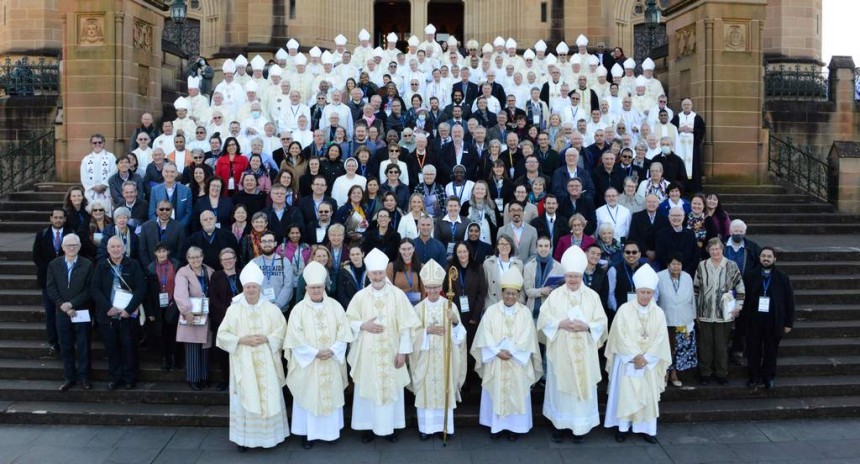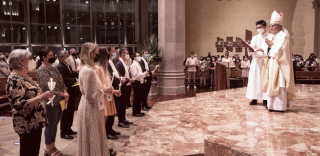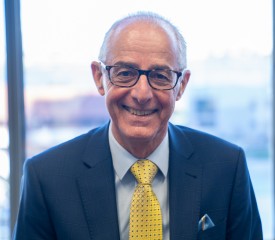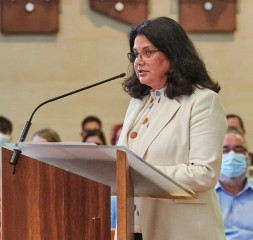Our Archdiocese
- Archbishop
- Bishop
- Vicar General & Episcopal Vicars
- Statistical Overview
- Boundaries of Archdiocese
- Organisational Structure
- Archdiocesan Assembly 2023-24
- Archdiocesan Plan 2016 - 2021
- History
- Coat of Arms
- Fifth Plenary Council of Australia
- Cathedral
- COVID-19 Position Statement
- Modern Slavery Statement
- Connect With Us
- MOBILE APP

Pastoral Letter from
The Most Rev Timothy Costelloe SDB
Archbishop of Perth
The Fifth Plenary Council of the Catholic Church in Australia
Wednesday 27 July 2022
Download the full text in PDF
Dear sisters and brothers in Christ,
The second and final assembly of the Fifth Plenary Council of the Catholic Church in Australia has concluded. After a long and intense journey of over four years the members of the Plenary Council, lay women and men, religious sisters, brothers and priests, diocesan clergy and all of Australia’s active bishops (as well as four retired bishops), met together in Sydney to formulate the response of the Catholic Church in Australia to a very important and fundamental question: what is God asking of us in Australia at this time?
In coming together in Sydney, the Members of the Plenary Council were living out in practice the way of being the Lord’s Church in our land which Pope Francis assures us is the call of God to the whole Church at this moment in our history. The Pope sums up this call in one word: synodality. It is a call, he explains, to walk together, listening carefully to each other as members of God’s holy people, so that through our journeying together, our talking to each other, and our deep, respectful and humble listening to each other we might begin to discover more clearly what God is asking of his Church at this time. In the end, of course, as members of God’s holy Church we must have only one aim: to live fully and faithfully our vocation as disciples of Jesus.

The experience of the Second Assembly of the Plenary Council mirrored the wider experience of the years of preparation for the Council: there is a burning desire in the hearts of many Catholics for the Church to be renewed so that it can be in reality what it is called to be by vocation: a living, faithful and effective sign of the ongoing presence of Christ in the world. The strength and urgency of that desire is a recognition of the reality that there is a real and distressing gap between where we are and where God is calling us to be. The awareness of the suffering inflicted on those who have been victims and are survivors of sexual abuse by Catholic clergy, religious and laity, has been ever present in the four years of preparation for the Plenary Council. So, too, has been the often condemnatory way in which those whose lives do not always live up to the high ideals of our Catholic faith have been treated. These are just two of the many ways in which people who have sought to engage with the Church have not been able to recognise the face of Christ in his ministers and in his people.
Equally, both in the two formal assemblies of the Plenary Council (the first assembly was held online last year due to the Covid pandemic), and in the many years of preparation for these two assemblies, there has been a recognition that, in spite of the many failures and limitations of individual Catholics and of Catholic communities, the Church remains a powerful force for good in our society.
 This is true in a number of ways. From an institutional point of view the Catholic Church in Australia, including here in WA, continues to be engaged in the work of the education of the young, in the provision of healthcare in our Catholic hospitals, in the care of the elderly in our many aged-care facilities, and in our outreach to those in our society who are disadvantaged or marginalised. In a less spectacular but no less important way the gospel is being lived out in the faith-filled lives of so many people in our parishes and in other Catholic faith communities. I am personally privileged to see this very clearly, for example, when all those adults who seek to be baptised or received into full communion with the Catholic Church gather together in the Cathedral during Lent each year to be welcomed by the community, represented by the bishop. More often than not it is personal encounters with faith-filled Catholics which has led people to recognise a call from God to enter into the community of the Church.
This is true in a number of ways. From an institutional point of view the Catholic Church in Australia, including here in WA, continues to be engaged in the work of the education of the young, in the provision of healthcare in our Catholic hospitals, in the care of the elderly in our many aged-care facilities, and in our outreach to those in our society who are disadvantaged or marginalised. In a less spectacular but no less important way the gospel is being lived out in the faith-filled lives of so many people in our parishes and in other Catholic faith communities. I am personally privileged to see this very clearly, for example, when all those adults who seek to be baptised or received into full communion with the Catholic Church gather together in the Cathedral during Lent each year to be welcomed by the community, represented by the bishop. More often than not it is personal encounters with faith-filled Catholics which has led people to recognise a call from God to enter into the community of the Church.
In the midst of the many challenges facing us at the moment - the ongoing Covid pandemic, the cost-of-living pressures, the inevitable challenges of family life, the rapid pace of change and the growing gap between the values of our faith and the values of the society in which we live - many Catholics live lives of quiet heroism, fidelity, compassion and forgiveness.  So, too, do our deacons and priests who continue, often in the face of the incomprehension of our society, to put their lives at the service of their brothers and sisters in the faith. They are witnesses to the power of the gospel to capture and transform people’s lives, as are the religious sisters, brothers and priests who, in spite of declining numbers, remain faithful to their vocation. And, of course, in our contemporary Church they are joined by so many lay women and men who work in the service of the Church and of God’s people.
So, too, do our deacons and priests who continue, often in the face of the incomprehension of our society, to put their lives at the service of their brothers and sisters in the faith. They are witnesses to the power of the gospel to capture and transform people’s lives, as are the religious sisters, brothers and priests who, in spite of declining numbers, remain faithful to their vocation. And, of course, in our contemporary Church they are joined by so many lay women and men who work in the service of the Church and of God’s people.
Both the lights and shadows of Catholic life in Australia were recognised by the Plenary Council. The decisions taken by the Council, which will be referred to Pope Francis for his reflection, guidance and, as appropriate, confirmation, will guide us as we now move forward. Here in the Archdiocese of Perth we will convene a Diocesan Synod to consider how best, in our particular context, to implement the decisions of the Council, once they have received the Pope’s formal approval. While it may be some time before the Pope returns to us with his decisions and recommendations, we can already begin to reflect together on the provisional outcomes of the Plenary Council.
Some are quite specific and, as they touch on matters which concern the teaching and discipline of the world-wide Catholic Church, have rightly been referred to the Holy See for advice. These include the possibility or otherwise of the Church admitting women to the ministry of deacon and the possibility of a wider use of the Third Rite of Reconciliation. These are, in a sense, the most contentious of the outcomes of the Plenary Council.

Because both of these matters touch upon the nature of the sacraments, specifically the Sacrament of Orders, the Eucharist, and the Sacrament of Penance, and therefore concern the whole Church and not just the Church in Australia, it is appropriate that we await the final decision of the Holy See. Pope Francis often reminds us that an essential part of synodality is listening to the Bishop of Rome. Communion with the Pope is an essential part of our Catholic identity. For my part I certainly intend to receive his decisions with openness and trust and implement them faithfully.
Other vital issues for the life of the Church were considered during the Final Assembly of the Plenary Council. These issues are grouped under the following headings: Reconciliation - Healing Wounds, Receiving Gifts; Choosing Repentance – Seeking Healing; Called by Christ – Sent Forth as Mission Disciples; Witnessing to the Equal Dignity of Woman and Men; Communion in Grace – Sacrament to the World; Formation and Leadership for Mission and Ministry; at the Service of Communion, Participation and Mission – Governance; Integral Ecology and Conversion for the Sake of Our Common Home; The Implementation Phase of the Fifth Plenary Council; The Decrees of the Fourth Plenary Council of Australia. (The draft text of these decrees can be accessed at the following link: plenarycouncil.catholic.org.au). Once these decrees receive final approbation from the Holy See, they will represent the pathways along which we, as the Church in Australia, will be called to walk.

One of the major legacies of the Plenary Council will be the process used to engage the whole Church in the prayerful preparations for the two assemblies. It was a process which focused on a readiness to listen carefully and openly to each other as sisters and brothers in the Church and, in that listening, seek to identify the voice of the Holy Spirit calling us forward. More than a call to ascertain the majority view, it was and is a call to read the signs of the times in the light of the gospel. In such an approach the fundamental criterion for decision becomes the harmony (or otherwise) between my own, or our own, desires or preferences and the will of God as expressed in the Scriptures as they are lived and believed in within the Catholic community of faith. It would be my sincere hope that this approach to decision-making might become the daily fare of all Catholic parishes, agencies, institutions and organs of leadership and governance in the Archdiocese of Perth. This will take time and will require both patience and humility as we learn to let go of some of our cherished positions in order to open ourselves to the often surprising leadings of the Holy Spirit. But it is, as Pope Francis assures us, the invitation of the Lord to his Church at this time in our history.
There is much more to say about the Plenary Council and the possibilities it opens up for us here in our Archdiocese. It will take time for the Pope to receive and reflect on the decisions we have taken and to return to us with his observations, reflections and decisions. We await his response with the trust, respect and openness which should be a mark of every Catholic faith community. 
I have appointed Mr Tony Giglia, who coordinated the engagement of our archdiocese with the Plenary Council preparations, to spearhead our response to the Plenary Council. One of his main tasks will be to begin remote preparations for the Diocesan Synod which will follow the formal approval of the Plenary Council’s decisions. I invite you all, and in a particular way those who are actively involved in the life of the Church, to cooperate with Tony as our local programmes unfold. The Archdiocese of Perth was recognized across Australia as a very active and engaged partner in the four years of preparation for the Council. It is important that we be equally committed as we move to the challenge of implementing the final outcomes of the Council.
In speaking of the response of the archdiocese I want to publicly acknowledge the Members of the Plenary Council who were drawn from our Catholic family here in Perth. To the lay women and men, the religious and the clergy who committed themselves to the long and demanding responsibility of Membership of the Council I want to express both my gratitude and my admiration. Every one of you made a significant contribution to this historic event and the whole archdiocese, and indeed the wider Church in Australia, is indebted to you. I also want to thank our local parish coordinators who, animated by Tony Giglia, enabled so many of our people to actively engage in the preparatory phase of the Council.
 Speaking more personally I want to thank in a particular way the staff in the Office of the Archbishop who supported me so well throughout this journey, Sr Kerry Willison RSM (Director, Centre for Liturgy), Diana Alteri (CEWA) and the staff in our Centre for Liturgy who also played a significant role, especially in the First Assembly.And lastly, and most importantly, I want to acknowledge the wonderful support of Catholic Education WA. Without the leadership of Dr Debra Sayce, Executive Director of Catholic Education WA, and the commitment and expertise of the IT department of CEWA, I don’t believe the two assemblies, which relied so heavily on technology, could have succeeded.
Speaking more personally I want to thank in a particular way the staff in the Office of the Archbishop who supported me so well throughout this journey, Sr Kerry Willison RSM (Director, Centre for Liturgy), Diana Alteri (CEWA) and the staff in our Centre for Liturgy who also played a significant role, especially in the First Assembly.And lastly, and most importantly, I want to acknowledge the wonderful support of Catholic Education WA. Without the leadership of Dr Debra Sayce, Executive Director of Catholic Education WA, and the commitment and expertise of the IT department of CEWA, I don’t believe the two assemblies, which relied so heavily on technology, could have succeeded.
In my homily at the closing Mass of the Second Assembly of the Plenary Council, celebrated in St Mary’s Cathedral in Sydney, I finished with what I hope was an encouraging thought. I offer it to you all now as we look to the future, not relying on ourselves, or at least not only and primarily on ourselves, but on the presence of the Holy Spirit. May God who has begun the good work in us bring it to fulfillment.
And so we end as we began, invoking the Holy Spirit in both gratitude and hope. What we have called the celebratory phase of our Plenary Council concludes with this Mass. The implementation phase will now make new demands upon us. We will have as much need of the Holy Spirit in moving forward as we have had up until now.
Perhaps, in this Cathedral dedicated to Mary as the Help of Christians, we might dare to believe that the words the angel Gabriel spoke to her are words which are spoken to us today:
“the Holy Spirit will come upon you and the power of the Most High will cover you with its shadow …. and Mary said, ‘Behold I am the servant of the Lord. Let what you have said be done to me’” (Lk 1:35-36)
Yours sincerely in Christ,

+Archbishop Timothy Costelloe SDB DD
Archbishop of Perth
